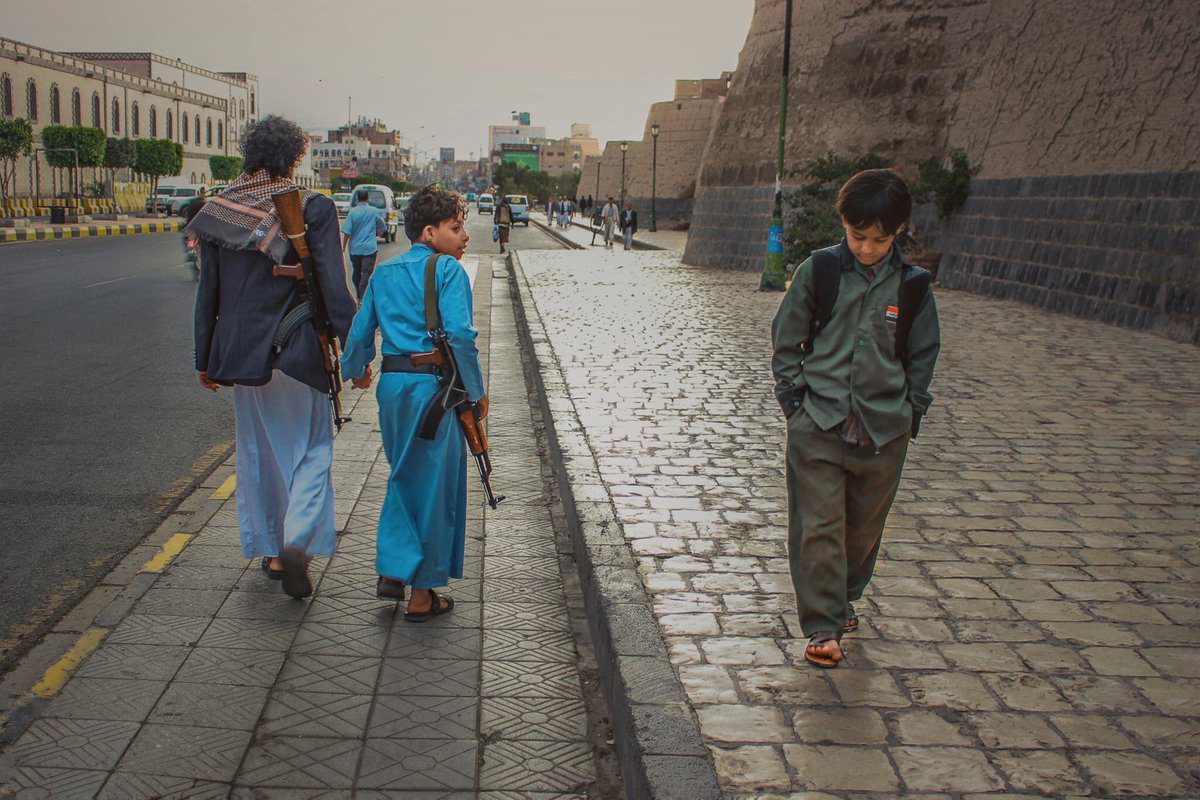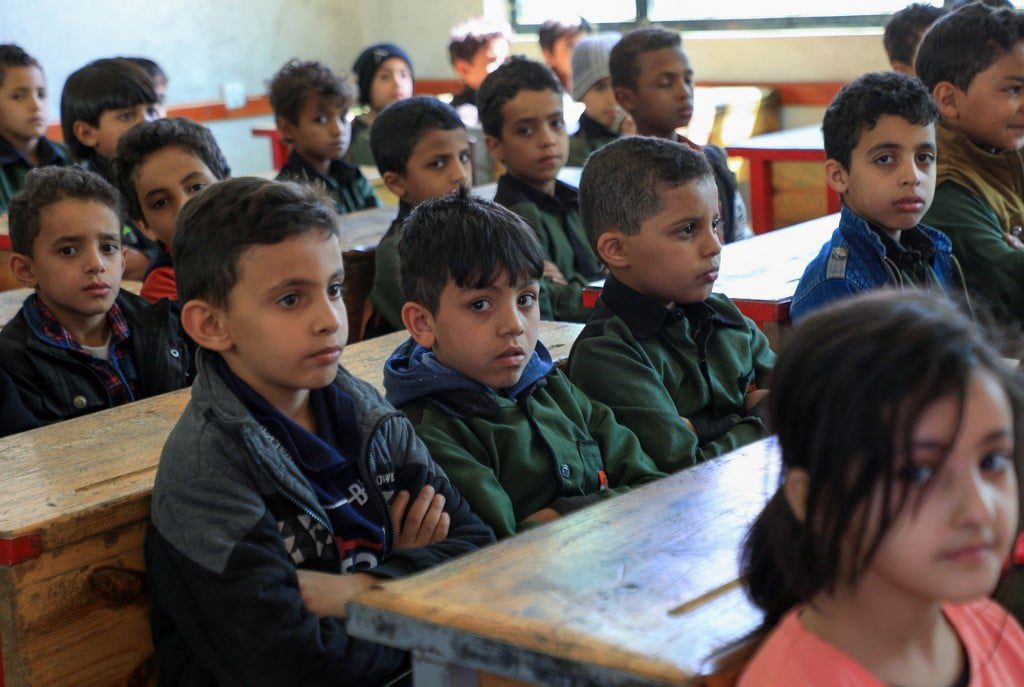From the Empty Bottle Model to Critical Thinking

Saba Hamzah
A poet, scholar, and educator from Yemen based in the Netherlands.
Victor Hugo once said, “He who opens a school door closes a prison,” indicating the importance of education in nation-building and creating a decent life. However, education in Yemen seems to be another prison door. Even before Houthis broke into the capital, education suffered from many problems, the most important of which are weak curricula, lack of sufficient, qualified teachers, and gender discrimination. Despite the government‘s attempts to spread basic education, its focus was on quantity, not quality.
Yemen’s educational system depends on the traditional pedagogy that assumes the student is an empty bottle or a blank page, and the teacher is the one who knows it all and whose main task is “filling the bottles “! Every day, the student goes to school to sit with trussed up arms and mouth to listen to one teacher after another, and then goes home to do their homework! Twelve years and sometimes fourteen years, if we count pre-schooling, students work as a printer, filled with ink throughout the year, emptied during the final exams.
Blind obedience appears to be the primary goal for such a system; the teacher finds himself obliged to remind students that “proper behaviour” comes before “learning.” This means that students must conform to everything, even if it contradicts their ideas and dignity. This leads to loss of the ability to think independently, self-awareness, and awareness of the students’ environment.
Upon graduation, Students’ accumulated knowledge from school is almost worthless. In school, they are merely passive recipients and are not provided with the tools needed to develop their skills. For instance, analytical and critical skills are not addressed; instead, they are suppressed since the initial years of education by silencing the student if she dares to ask cognitive or existential questions that would “undermine faith” or are considered “indecent.”
Despite the spread of private schools, it is scarce to find those who try to use innovative teaching methods, and this is because teachers themselves are the outputs of an educational system that sweeps students’ abilities instead of training and refining their skills. As for the bulk of private schools, they are just projects and profitable businesses that any investor can invest in and often lead the school and decide students’ future.
This educational system was referred to by the Brazilian educator and philosopher Paulo Freire as “banking education” because it depends mainly on “receiving” and storing information, considering students as empty safes. What is totally ignored in this system is that students are not blank pages or empty safes. Students attend school loaded with ideas and information about the world and the things they learn or acquire through interactions within the environment in which they grow up and with families with which they live. They arrive filled with questions and ideas that either grow with time or die out forever.

Such a system’s output is usually unhappy graduates who spend years memorizing things they often will never need. They lack the necessary skills to pave their way to a good life. They can be easily manipulated and used as pawns in the power board. Therefore, it is not surprising that we find educators and students who join armed groups influenced by ideologies that found their way into their minds early on.
The current generation is living in the shadow of the worst humanitarian and educational disaster ever. Millions of children in Yemen have been deprived of formal education for years. This situation is an inevitable consequence of the ongoing war since 2014. According to the United Nations, thousands of schools are entirely out of service, either because they have been destroyed or because they have been turned into refugee shelters or occupied by militant groups. Several schools are located in conflict areas, putting students’ lives at risk.
Moreover, millions of families live below the poverty line, making sending children to school a challenge. When a family lives on one meal a day because they cannot afford to secure food, financing a child’s education is almost impossible. This deprives children of schooling and makes them vulnerable to child labor because they are forced to assist their families or be recruited as child soldiers. It also exposes girls in particular to early marriage and burdens them with responsibilities that exceed their abilities.
In general, providing education in areas of armed conflict throughout Yemen is a challenge. But what makes it worse in areas controlled by the Houthis, in particular, is their use of schools for mobilization of child soldiers and ideologizing school curricula and activities. Furthermore, the media reports that they started the privatization of public schools. These are all crimes against the new generation’s future, which can be added to Houthis’ criminal record of murder and oppression. Houthis have introduced their racist ideology to Yemeni schools, cognitive places which should be neutral. Their ideology considers their group superior to other Yemenis and is entitled to advantages based on race, in addition to the former regime’s policy that had deprived some minorities, such as black Yemenis and Jews, of their most basic rights, which is access to education.
What must be done immediately is finding all the available means and opportunities that can be created, not only to ensure the continuity of education but most importantly to develop it and to find alternative methods that contribute to the upbringing of a generation that can make a worthy life out of its future rather than losing its present. Unfortunately, most of the concerned organizations and youth initiatives focus only on providing physical schooling requirements for students or schools without considering their pressing problems. While their role must focus on training teachers and students owing to the fact that education can be a strong tool for ending the conflict.
Teachers must be trained on alternative educational methods other than traditional methods. The focus has to shift from transferring knowledge to building students’ skills and providing them with critical and analytical tools to make any ideology they encounter subject to examination and scrutiny. For instance, during World War II, Maria Montessori, an Italian professor, visited India to provide training to some schools on an educational system that she developed. Montessori’s method focuses on children’s skills and develops their abilities. This system is devoid of grading, eliminating competition among students, and specifying the teacher’s role to evaluate students’ skills and assist them accordingly. It is a system that enhances the children’s spirit of criticism and independent thinking. It allows them to innovate, explore new paths in life, and continuously review their thoughts and behavior. This type of education differs or is opposed to in spirit; the competitive model contributes to magnifying the ego and the belief of students’ own opinions and behaviour, even if they are incorrect.
Freire believes that dialogue education, or what he calls it pedagogy of the oppressed, is the best way to educate the student, with a curriculum that enhances the critical sense and deals with the students as partners in the educational process and puts their questions and ideas into consideration, and the teacher’s role here is to supervise the educational process.
UNESCO has been promoting a culture of peace and non-violence through education in countries after a conflict took place for decades. However, Yemen cannot wait until post-conflict to implement peace education; this must happen now. Although it is hard to change the schools’ curriculum, especially in the parts ruled by the militia, there are different ways to teach students besides regular schools. One way is by integrating critical thinking through art. Several youth initiatives focus on art spread after the war; however, only a few students benefit from them. Art plays a great role in the way people see and interact with the world. It will help the students to explore, analyze, produce, and even to heal. Organizations and sponsors must invest more in this field and try to include more students.
To sum up, although education, regardless of its degree of quality and competence, is a right for every child, it is essential to emphasize that Yemen needs education based on quality, not just quantity. We should focus on training teachers and students on critical thinking and dialogue. We should enforce mutual respect and recognition of each individual’s independence, dignity, and mental and psychological competence and refine their various skills. This type of education will create a conscious generation, capable of making a change and immune to manipulating propaganda used by political and ideological groups today, which have led the country to the current state of political, economic, moral, and cultural deterioration.
References:
[1] https://www.unicef.org/emergencies/yemen-crisis#:~:text=Yemen%20is%20the%20largest%20humanitarian%20crisis%20in%20the%20world%2C%20with,hell%20for%20the%20country’s%20children
[2] https://en.unesco.org/
[3] MLA. Freire, Paulo, 1921-1997. Pedagogy Of the Oppressed. New York :Continuum, 2000.
[4] https://montessori-nw.org/about-montessori-education#:~:text=Montessori%20is%20a%20method%20of,activities%20to%20guide%20the%20process.
[5] https://www.mei.edu/publications/new-houthi-imposed-university-curriculum-reportedly-glorifies-iran-promotes:
DISCLAIMER
The opinions expressed in this publication are those of our bloggers. They do not purport to reflect the opinions or views of Fanack or its Board of Editors.


